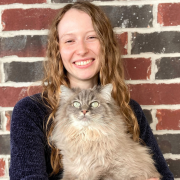Research shows that a cat or dog that maintains its ideal body weight is less likely to experience chronic ailments such as diabetes, joint or mobility issues and may have a longer lifespan compared to pets with obesity. Yet, according to the Canadian Veterinary Medical Association, between 50 and 60 percent of pets in Canada are currently overweight or obese.
Dr. Jason Coe, a Professor in the Department of Population Medicine at the Ontario Veterinary College (OVC) and the VCA Canada Chair in Relationship-Centred Veterinary Medicine, together with postdoctoral fellow Dr. Kat Sutherland, are exploring ways to support both pet owners and veterinarians in achieving healthy body weight for pets.
Their research initially set out to better understand the current state of obesity-related communication between pet owners and veterinary professionals and identify opportunities for veterinary teams to use tailored approaches to help clients manage their pet’s obesity. However, early data from their research presented a red flag when it comes to pet owners’ readiness to address their pets’ obesity.
In one of their studies, researchers used an online survey where 532 pet owners were asked to self-identify their pet’s body condition score. Those who identified their pet as being overweight or obese were asked to complete a follow-up survey indicating their readiness to take action to address their pets’ excess weight. The follow-up results showed that an overwhelming 94 percent of pet owners who identified their pet as being overweight or obese had low levels of readiness, meaning they were not considering or were still contemplating taking action to address their pets’ excess weight.
The statistic was an eye-opener for the research team, who hypothesized that encouraging veterinary professionals to prescribe weight management plans before pet owners were ready to take action could negatively impact clinician-client relationships.
 “When a client and a veterinarian are at different stages of readiness, there is the risk of creating friction, or what's experienced as resistance in the conversation,” said Sutherland. “When there's that misalignment, veterinarians may inadvertently break down the rapport with their clients rather than come up with a plan that's mutually agreeable for both parties.”
“When a client and a veterinarian are at different stages of readiness, there is the risk of creating friction, or what's experienced as resistance in the conversation,” said Sutherland. “When there's that misalignment, veterinarians may inadvertently break down the rapport with their clients rather than come up with a plan that's mutually agreeable for both parties.”
So, what’s next? According to the research team, more education is needed for pet owners to continue raising awareness about the benefits of achieving and maintaining an ideal body condition score for pets. Yet, it is equally important for veterinary professionals to acknowledge their clients’ perspectives and individual challenges to pursuing pet weight loss that sometimes may be outside of their control.
 “An effective weight loss or weight maintenance strategy that works for some pet owners is using a scale to measure out their pet’s full daily caloric intake in the morning and then separate it into breakfast, dinner and have a third pile that's designated for treats that they feed their pet throughout the day,” said Coe. “However, that’s not always a perfect solution. I have three kids at home and they drop food on the floor all the time. So, as a pet owner, I need to account for that as part of my dog’s caloric intake.”
“An effective weight loss or weight maintenance strategy that works for some pet owners is using a scale to measure out their pet’s full daily caloric intake in the morning and then separate it into breakfast, dinner and have a third pile that's designated for treats that they feed their pet throughout the day,” said Coe. “However, that’s not always a perfect solution. I have three kids at home and they drop food on the floor all the time. So, as a pet owner, I need to account for that as part of my dog’s caloric intake.”
“Learning how to evaluate their pet’s body condition at home is another way that pet owners and other family members can get involved and invested in working toward their pet’s ideal body weight,” said Sutherland.
Medical evidence supports that even modest weight loss can improve a pet's quality of life.
The path to helping a pet reach their ideal body weight is rarely a straight line. Pet owners should be prepared for possible regressions and for the 'begging burst' that often comes at the start of a new diet routine. Modifications may be needed along the way, but consistency is key.
“Tackling the weight loss journey one small step at a time might also help overcome setbacks and the sense of – ‘this is just a lot and there’s no way I’m going to be able to achieve that’,” said Sutherland. “And rather than always relying on the veterinarian to initiate the conversation, a team-based approach between the pet owner and their veterinary team is more likely to tip the scales in the right direction.”
Drs. Coe and Sutherland are continuing their research to better understand pet owner perceptions and developing tools for both pet owners and veterinary professionals to collaboratively work on weight management strategies for pets. Their research initiative is funded in part by OVC Pet Trust.

